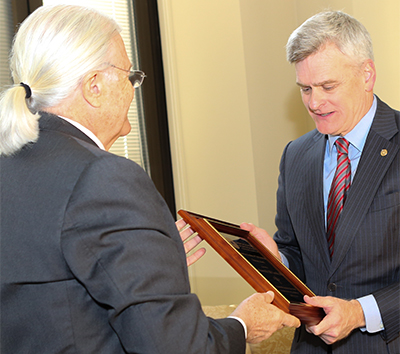Strengthening National Advocacy Profile With Record Member Engagement

Academy president William L. Rich III, MD, presents the Academy's Visionary Award to Sen. Bill Cassidy, MD, R-La., for his long-standing support for ophthalmology and our patients.
Shaping public policy
The Academy’s annual Mid-Year Forum in Washington, D.C., brings together our members and other ophthalmic leaders to learn about legislative and regulatory issues facing the profession. We also meet with federal lawmakers to help shape public policy.
Session topics in 2016 included Medicare physician payment programs; how the Academy’s IRIS Registry can benefit your practice and the challenges regarding public disclosure of physician-specific performance and payment data.
A record 164 Academy advocacy ambassadors attended the second annual L.E.A.P. (Leadership, Engagement, Advocacy, Practice Management) Forward session during Mid-Year Forum 2016. This program educated members-in-training on the importance of advocating for their profession and actively participating in state and subspecialty societies. Leslie A. Tobe, MD, a 2016 program participant, said, “I found it addressed real issues of advocacy, leadership and practice management, which are things we don’t get access to in residency training.” The Indiana University School of Medicine sponsored Dr. Tobe.
The Academy also honored five members of Congress for their efforts to advance the quality of eye care. We presented the Visionary Award to Sen. Bill Cassidy, MD, R-La., and Reps. Phil Roe, MD, R-Tenn.; Paul Tonko, D-N.Y.; Raul Ruiz, MD, D-Calif.; and Ami Bera, MD, D-Calif.
Engaging one on one with elected officials
At the Mid-Year Forum 2016 Congressional Advocacy Day, a record 421 ophthalmologists met on Capitol Hill with legislators and their staff to present the concerns and positions of our profession.
- 2016 Medicare fee cuts for glaucoma and retina surgical codes: After our meetings, several members of Congress joined the Academy’s campaign to ask CMS to re-evaluate the flawed methodology used when determining cuts to surgical codes earlier in the year. The immediate impact was a $14 million annual improvement in scheduled payments for ophthalmology.
- Proposed Part B drug demo: Ophthalmologists expressed strong concerns about the impact of CMS’ Medicare Part B drug demonstration proposal, which would change how the agency reimburses you for drugs you administer in your offices. After our meetings, more than 300 members of Congress told CMS they opposed the plan. CMS’ decision in December to not proceed with this proposal was a direct result of our bipartisan advocacy effort.